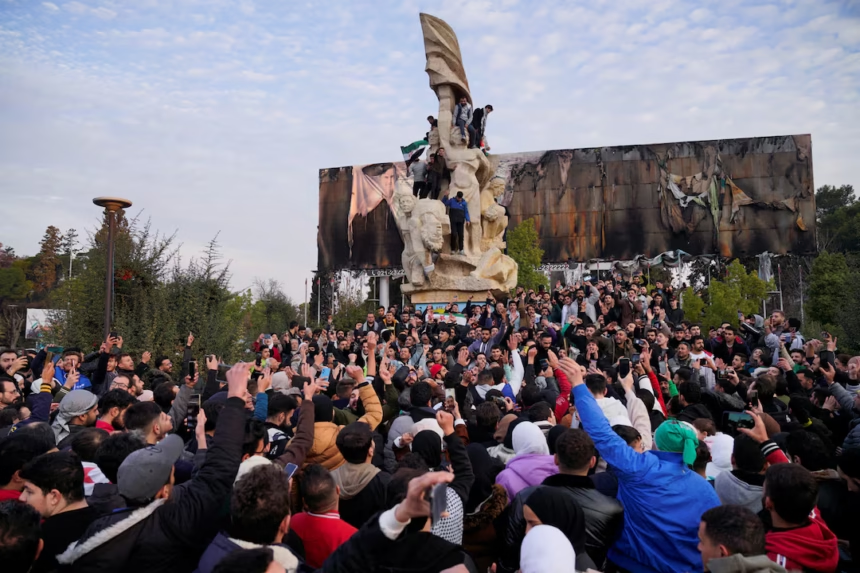Russian support was not enough to keep Bashar al-Assad in power in Syria.
After more than 50 years in power, the Assad dynasty is coming to an end.
Syrian President Bashar al-Assad’s government collapsed on Sunday as opposition forces seized Damascus, ending more than fifty years of Assad family rule and profoundly reshaping regional power structures, Reuters reported.
The rapid rebel push into the capital prompted Assad’s hasty departure early on Sunday, his whereabouts currently uncertain.
Reuters’ sources indicate that two senior military officials verified Mr. Assad’s departure from Damascus. The Russian Foreign Ministry subsequently confirmed his departure, noting that he had authorized a peaceful transition before leaving Syria.
“The noble Syrian revolution has moved from the phase of fighting to overthrow the Assad regime to the challenge of collectively building a Syria worthy of the sacrifices of its people,” the Syrian opposition coalition announced in an official statement sent to Reuters.
The capture of Damascus took place with unprecedented speed.
According to eyewitnesses who spoke to Reuters, crowds of jubilant Syrians gathered in the capital’s central square, shouting “Freedom” as opposition forces entered without much resistance.
The near-total absence of military opposition indicates a complete collapse of regime control, with Syria’s military leadership officially informing officers of Assad’s fall, a Syrian officer told Reuters.
Sources quoted by Reuters described civilians entering the Al-Rawda presidential palace, some removing furniture. The opposition announced that it had released thousands of detainees from a large prison near Damascus, symbolically ending generations of government oppression.
The dissolution of the government had immediate consequences throughout the Middle East. Iran’s Press TV reported that opposition forces had taken control of the Damascus embassy. More importantly, according to two Lebanese security officials who spoke to Reuters, Hezbollah, the Lebanese militant organization that provided vital military aid to Mr. Assad, had withdrawn all its forces from Syria on Saturday, as opposition forces approached the capital.
The rapid collapse of Assad’s power structure has particularly affected Russia’s regional position. As Reuters reports, although it retained two military installations in Syria and provided crucial intervention in 2015 to support Assad’s government, Moscow’s ongoing military commitments in Ukraine have limited its ability to prevent the regime’s fall.
As Syria enters a new phase, the country faces complex challenges in establishing stable governance. According to Reuters, Prime Minister Mohammad Ghazi al-Jalali has called for democratic elections and reported ongoing negotiations with opposition leader Abu Mohammed al-Golani regarding the transition period. However, analysts warn that the way forward is complicated by the divergent interests of different groups. “The crucial question is the order of this transition,” Joshua Landis, director of the Center for Middle East Studies at the University of Oklahoma, told Reuters. “Golani very much wants an orderly process. They will need relief from European and American sanctions.”
According to Reuters coverage of the Manama Dialogue security conference in Bahrain, Assistant Secretary of Defense for the Middle East Daniel Shapiro said US forces would maintain their presence in eastern Syria to prevent the resurgence of the Islamic State. Simultaneously, Turkish Foreign Minister Hakan Fidan warned against terrorist organizations exploiting the power vacuum.
At the same meeting, the United Arab Emirates’ diplomatic adviser, Anwar Gargash, expressed concern about extremism while suggesting that Assad’s downfall stemmed from his rejection of previous Arab diplomatic initiatives. Regional security sources have informed Reuters that Israel, which has long regarded the Assad regime as an adversary, has positioned forces along the Syrian buffer zone monitored by the United Nations. The same sources reported suspected Israeli strikes on the Mazzeh district and the Khalkhala airbase in Damascus, apparently targeting weapons stockpiles to prevent their acquisition by radical groups.
Syria is at a historic turning point after 13 years of devastating civil conflict that has claimed hundreds of thousands of lives and displaced millions more. As Reuters reports, the international community faces crucial decisions about engaging with a new administration where Hayat Tahrir al-Sham (HTS), still designated as a terrorist organization globally, could exert significant influence.
The success of the transition will largely depend on maintaining stability in the newly secured territories and establishing governance frameworks acceptable to national and international stakeholders. With Assad’s departure marking a historic turning point, Syria’s fate remains uncertain as the various factions embark on the complex process of rebuilding a nation devastated by years of conflict.
Pyrrhic victory for the United States
A Pyrrhic victory, but a victory nonetheless for the United States, which had been trying to destabilize the Assad regime for many years. In 2013, after suspecting President Bashar al-Assad of using chemical weapons against his people, then US President Barack Obama drew a “red line”. Obama declared that Assad’s use of chemical weapons would be a “red line” that would have “enormous consequences” and “change [his] calculus” about US military intervention in Syria’s civil war. A line that the Syrian dictator had crossed without major consequences, thanks to the help of his steadfast ally, Russia’s Vladimir Putin.
More than ten years later, the situation has completely changed. Russia’s strongman is engaged in a war in Ukraine, the potential consequences of which he certainly hadn’t fully appreciated. Thousands of Russian army soldiers have been killed, forcing Vladimir Putin to call on North Korea, which has sent thousands of soldiers to Russia to fight alongside Russian forces, according to Western media.
In Syria, discussions are already underway between the various parties involved in the conflict to avoid repeating the mistakes made in Libya and other countries in the region destroyed by the West, led by the superpower United States.
Consultations aimed at facilitating a smooth transition have already begun, BBC News reported.
This article was compiled from a Reuters report, with additional context and analysis by CTN. You can view the Reuters article by clicking here.







